I'm doing a C++ project for a PCB assembly thesis and I have been given (by my professor) an old set of C++ code. When I try test and run the code it chrashes...the program compiles ok, but it chrashes at runtime..here is the code:
main.cpp:
#include <iostream>
#include <vector>
#include <string>
#include <cstdlib>
#include <ctime>
#include <climits>
#include "NozzleBank.h"
#include "PlacementHead.h"
int main (int argc, char * const argv[]) {
std::vector<char> list;
for (int i=0; i<3; i++) {list.push_back('a');}
for (int i=0; i<3; i++) {list.push_back('b');}
for (int i=0; i<3; i++) {list.push_back('c');}
for (int i=0; i<3; i++) {list.push_back('d');}
for (int i=0; i<3; i++) {list.push_back('_');}
int i = 0;
char set[list.size()];
while (!list.empty()) {
int x = (rand() % list.size());
set[i] = list.at(x);
list.erase(list.begin()+x);
i++;
}
NozzleBank bank(15,set);
PlacementHead head(4,2,1,"abababab");
return 0;
}
PlacementHead.cpp:
#include "PlacementHead.h"
#include <string>
#include <iostream>
#include <string.h>
PlacementHead::PlacementHead(int width, int height, int gap, char* s) {
width_ = width;
height_ = height;
gap_ = gap;
size_ = (width*height)+1;
set_ = new char[size_];
from_ = new int[size_];
original_ = new char[size_];
strcpy(set_,s);
strcpy(original_,s);
}
PlacementHead::~PlacementHead() {
}
int PlacementHead::getSize() { return size_; }
int PlacementHead::getHeight() { return height_; }
int PlacementHead::getWidth() { return width_; }
int PlacementHead::getGap() { return gap_; }
// Palauttaa indeksissä i olevan suuttimen
char PlacementHead::getNozzle(int i) {
return set_[i-1];
}
// Asettaa indeksissä i olevan suuttimen
void PlacementHead::setNozzle(int i, char c) {
set_[i-1] = c;
}
// Merkitsee suuttimen poimituksi poistamalla sen listasta
void PlacementHead::markNozzle(int i, int bankPos) {
set_[i-1] = ' ';
from_[i-1] = bankPos;
}
// Palauttaa seuraavan poimimattoman suuttimen indeksin
int PlacementHead::getNextUnmarkedPos() {
for (int i=0; i<size_; i++) {
if (set_[i]!=' ') {
return i+1;
}
}
return 0;
}
// Palauttaa suuttimen alkuperäisen sijainnin pankissa
int PlacementHead::getBankPos(int i) {
return from_[i-1];
}
// Plauttaa alkuperäisen ladontapaan suutinjärjestyksen
void PlacementHead::reset() {
//for (int i=0; i<size_; i++) {
// set_[i] = original_[i];
//}
strcpy(set_,original_);
}
// Tulostusmetodi
void PlacementHead::print() {
std::cout << "ladontapää:\n";
for (int h=height_; h>0; h--) {
for (int w=width_; w>0; w--) {
int i = ((h-1)*width_)+w;
std::cout << getNozzle(i);
}
std::cout << "\n";
}
}
NozzleBank.cpp:
#include "NozzleBank.h"
#include <string>
#include <iostream>
#include <string.h>
NozzleBank::NozzleBank(int size) {
bank_ = new char[size];
original_ = new char[size];
size_=size;
for (int i=0; i<size_; i++) {
bank_[i] = ' ';
original_[i] = ' ';
}
}
NozzleBank::NozzleBank(int size, char* s) {
bank_ = new char[size];
original_ = new char[size];
size_ = size;
strcpy(bank_,s);
strcpy(original_,s);
}
NozzleBank::~NozzleBank() {
}
int NozzleBank::getSize() { return size_; }
// Palauttaa pankin alkuperäisen järjestyksen
void NozzleBank::reset() {
strcpy(bank_,original_);
}
// Asettaa indeksissä i olevan suuttimen
void NozzleBank::setNozzle(int i, char c) {
bank_[i-1] = c;
original_[i-1] = c;
}
// Palauttaa indeksissä i olevan suuttimen
char NozzleBank::getNozzle(int i) {
return bank_[i-1];
}
// Poimii suuttimen poistamalla sen listasta
void NozzleBank::pickNozzle(int i) {
bank_[i-1] = ' ';
}
// Tulostusmetodi
void NozzleBank::print() {
for (int i=size_; i>0; i--) {
std::cout << bank_[i-1];
}
}
When I run the program I get the following:


Now here is also an interesting thing: IF I switch the order of the following lines in main.cpp
NozzleBank bank(15,set);
PlacementHead head(4,2,1,"abababab");
to:
PlacementHead head(4,2,1,"abababab");
NozzleBank bank(15,set);
The program runs fine...:O? And here I get like whaaaat...I'm a bit newbie in C++ so I'd appreciate if someone could see what's the problem :) Thank you for any help!